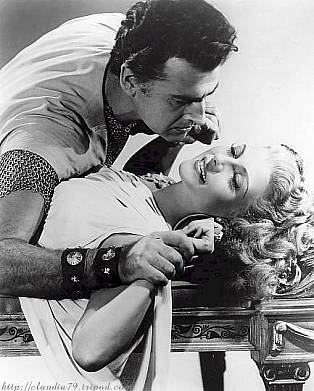 Salome (1953)
Salome (1953)
A Beckworth Corporation Production
Producer: Buddy Adler
Screenplay: Harry Kleiner, from story
The Stars:
Dance staged by Valerie Bettis
Color, 103 mins. running time |
 Salome (1953)
Salome (1953)
A Beckworth Corporation Production
Producer: Buddy Adler
Screenplay: Harry Kleiner, from story
The Stars:
Dance staged by Valerie Bettis
Color, 103 mins. running time |
| Rita was pushed into Salome immediately after her big "comeback" in Affair in Trinidad. She was tired and needed a break between films. When Columbia boss Harry Cohn, a man often described as "tyrannical", refused, she gathered her courage and stood up to him by simply not showing up at the studio. Rita won this round and managed to take a small vacation before returning to work on Salome. She stars in the title role in this film, which tells the story of Princess Salome. However, the Hollywood version of this biblical tale is far removed from the story found in the New Testament. Therefore, the proceeding synopsis is not a summary of the biblical story of Salome, but that of Columbia Picture's 1953 rewrite.
The prophet, John the Baptist (Alan Badel), speaks to the people of the sinful lives lead by King Herod (Charles Laughton) and Queen Herodias (Judith Anderson) of Galilee. The queen wants him killed for his outspokenness. But the king keeps him alive because he believes John the Baptist is the Messiah, and fears a prophecy stating that if a king of the house of Herod does harm to the Messiah, he will die an agonizing death. Elsewhere, in Rome, Herodias' daughter, Princess Salome (Rita Hayworth), has fallen in love with Marcellus Fabius (Rex Reason). His uncle is Caesar Tiberius (Sir Cedric Hardwicke), ruler of the Roman Empire. To prevent his nephew from marrying Salome, a "barbarian" from Galilee, she is banished from Rome, where she had lived since childhood. Salome is sent "home" to Galilee and a hatred grows in her for all Romans. Also onboard the ship bound for Galilee is Commander Claudius (Stewart Granger). Because of her aversion to Romans, she rejects his advances, keeping him at a distance. Once she has arrived at the palace, King Herod openly shows interest in his beautiful daughter-in-law. Having witnessed this, Queen Herodias makes plans to use Salome to entice the king into ordering the death of John the Baptist. Sensing her mother's fear of the prophet, she goes into town to hear what he says of her. Under pressure to keep John the Baptist from speaking against the house of Herod, the king has him arrested. Commander Claudius does all he can to have him released but nothing can be done. Meanwhile, Salome realizes that John the Baptist speaks the truth about her mother when Herodias asks her to dance for the king to persuade him to kill the prophet, even though dancing for him will make Salome become his possession. Salome now wants to leave Galilee with Claudius, whom she has come to love. But first, she must get Herod to release John the Baptist. She realizes there is only one way -she must dance for him, and in return request John the Baptist's release. Salome does her infamous "Dance of the Seven Veils", and King Herod is prepared to give her anything she desires. During the performance, Herodias tells Herod that Salome's request is for the head of John the Baptist. The task is carried out, and the head presented to the horrified Salome on a silver platter. The king and queen are left to face the doom that was prophesized for them, while Salome and Claudius flee Galilee to follow Jesus Christ. Hollywood was producing a lot of biblical epics at the time Salome was made. The studios were attempting to halt the rise of television by offering movie patrons these lavish Technicolor spectacles that allowed for eye-appealing sets and period costumes. Released on March 24, 1953, Salome was a success at the box-office, but not with the critics. One reviewer called it "a shameless perversion of the Bible and a blot on Hollywood's record." Though it may have turned a modest profit, I personally do not care for Salome. Rita disliked the film herself. If you ignore the rest, Rita does have her moments however. The highlight is of course her famous "Dance of the Seven Veils", but it's cut short when John the Baptist is killed. |
